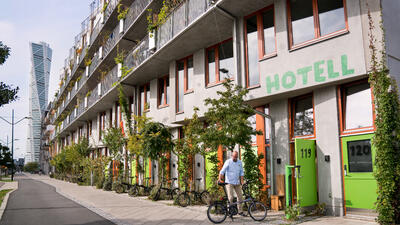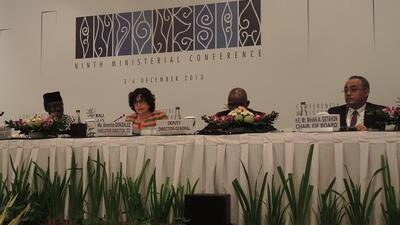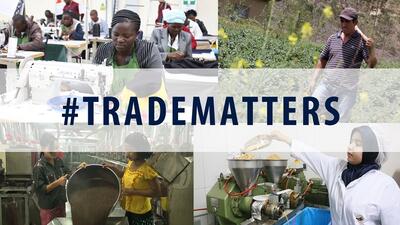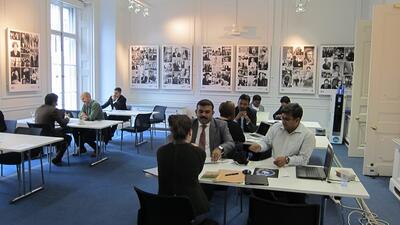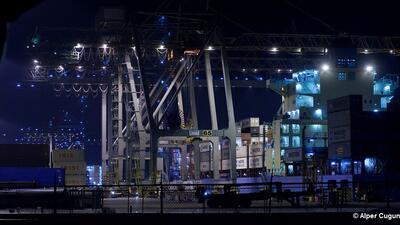

The feminist approach to inclusive trade and policymaking
Sweden has proven that equal opportunities for women and men is good for job creation and good for economic growth
When the current Swedish government came into power in 2014, the first thing it did was to state it is a feminist government. As such it made a clear commitment to promoting gender equality in all policymaking.
During the past years the government has combatted inhibitive gender roles and structures and we have let gender equality have a formative impact on policy choices, priorities, and in allocation of resources. The Swedish government pursues this agenda in all facets of its work – in Sweden, in the European Union and globally. Gender equality will permeate all areas of Sweden’s foreign policy: development cooperation, security, promotion, public diplomacy and, of course, trade.
For the government, a feminist foreign policy is aimed at achieving gender equality by eliminating all forms of discrimination against women and girls and improving general conditions for women and girls. It is a question of human rights, but also of equal opportunities allowing men and women to use their potential and contribute to society. But it is also a question of smart economics.
The world has witnessed an enormous economic transformation over the past three decades. As goods, services, capital, and people flow across countries faster than ever before, information and knowledge have become global commodities. Economic globalization and trade can channel and reinforce universal values of democracy, equality and human rights as ideas and skills move from one country to another.
Women’s participation in the economy, as entrepreneurs, employees, leaders, producers and consumers is a measure of a country’s economic viability and progress. Access to resources and economic opportunities for women and girl – and the knowledge to make use of these – enables strategic choices that can lead to positive change. Gender-based inequalities impose significant development costs on societies: they reduce the growth potential, the productivity and the performance of the economy as a whole. Economic data tells us that countries in which more women participate in the labour market enjoy greater economic growth than countries that restrict the possibilities of women to work on equal terms as men.
In the case of Sweden, women’s economic empowerment and participation in the labour force were made possible mainly through three reforms: the abolition of the joint taxation system, the expansion of publicly-funded affordable child and elderly care, and the reform of the parental insurance that allows mothers and fathers to take parental leave on equal terms.
As trade minister I wish to see that trade contributes to growth and jobs. It would be provocative to say that I want this to happen just for men. But in practice this could be the case. The problem is that we do not always know whether the actions or policies we discuss or decide upon are as beneficial for women as they are for men.
Because the link between trade and gender is complex and to a large extent depend on national circumstances. The effects can go both ways. Trade and trade liberalization can affect equality, but the equality situation in a country may also affect its ability to trade.
Generally, trade liberalization has helped to create more jobs and stronger connection to markets for both men and women. But, although trade rules are generally intended to be gender-neutral, international trade and trade liberalization can effect men and women differently.
To ensure women’s equal access to global trade markets, this dimension needs to be integrated into discussions on international trade and trade policy, whether they take place at the World Trade Organization, the United Nations Conference on Trade and Development (UNCTAD) or the Organisation for Economic Cooperation and Development (OECD).
A challenge is the slow progress regarding gender analysis, which is as complex as it is crucial. Getting an accurate picture will enable us to design policies and measures in a way that favours women’s empowerment and well-being, and at the same time avoids increasing gender inequality and mitigating existing disparities.
Unfortunately, the UN estimates that there are currently only available and reliable data to follow up a mere one-third of the global targets.
Add gender-specific data and the situation is even worse. Only a third of the world’s nations gather data that makes it possible to measure and understand women’s and girls’ economic situation. Hundreds of millions of women and girls are still invisible.
Governments and relevant international organizations need to give priority to further analysis and collecting statistical data that is gender-differentiated.
Therefore, Sweden supports various efforts in this area, as for example UNCTAD’s tool box on trade and gender, which I launched together with Secretary-General Mukhisa Kituyi last year. The tool box is meant to assess to what extent trade policies affect men and women in a distinctive manner.
Sweden also supports the important work of the International Trade Centre (ITC), an organization with long experience in the field of trade and gender that has been able to collect valuable information and data, in addition to analysis in the field.
The OECD is an organization with a clear strength in cross-sectoral analysis. A welcome addition to what other organizations are doing is therefore the growing interest in the OECD to deepen its analysis also on trade and gender. The World Bank Development Report from 2012 on gender equality and development was ground-breaking and we are looking forward to more analysis that will contribute to deepened understanding in the trade and gender nexus.
In April, Minister for Foreign Affairs Margot Wallström, Minster for International Development Cooperation Isabella Lövin and myself will host the Stockholm Forum on Gender Equality. This will cover critical issues and seek common solutions around human rights, representation and access to resources for women and girls. Participants from civil society, private sector, governments and academia will gather to exchange experiences, methods and strengthen dialogue. It will also be an opportunity to experience the feminist perspective in Swedish foreign policy during recent years.
For more information on the Stockholm Forum on Gender Equality, please visit genderequalworld.com.




